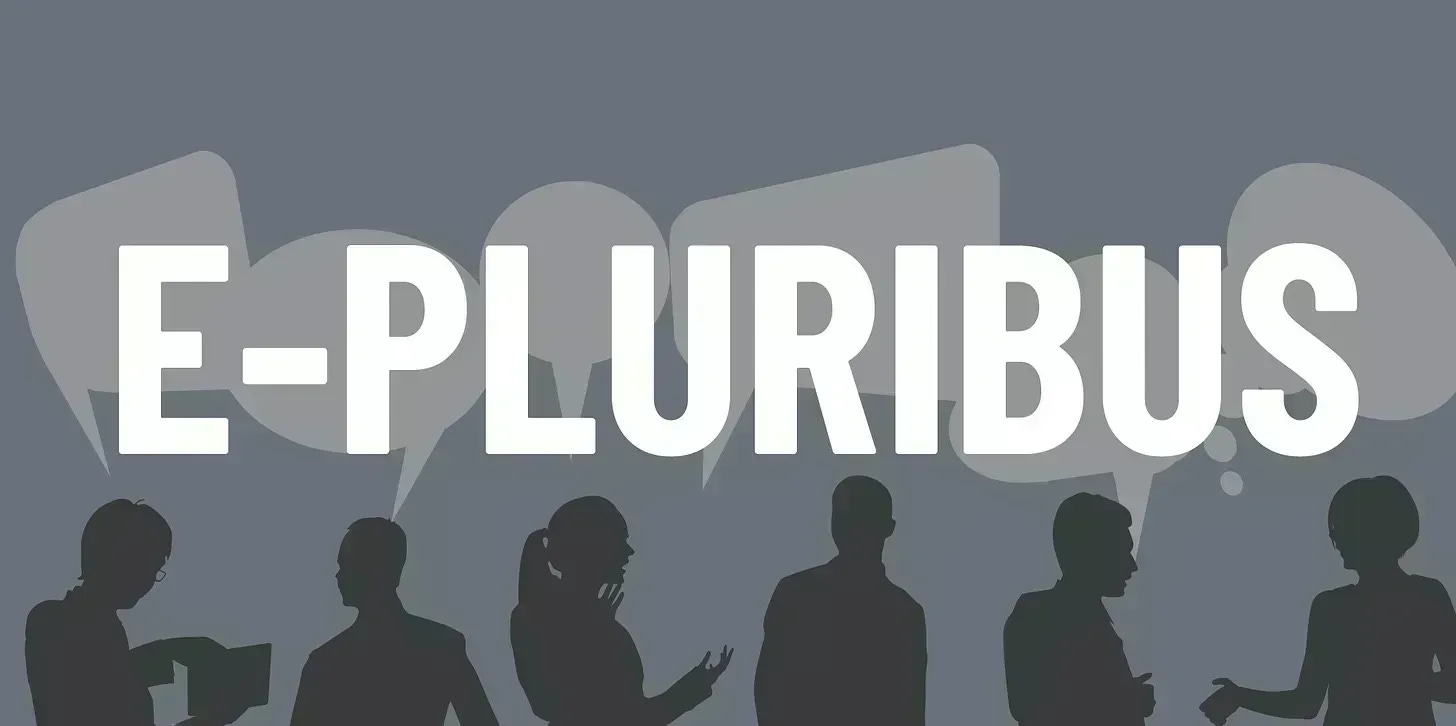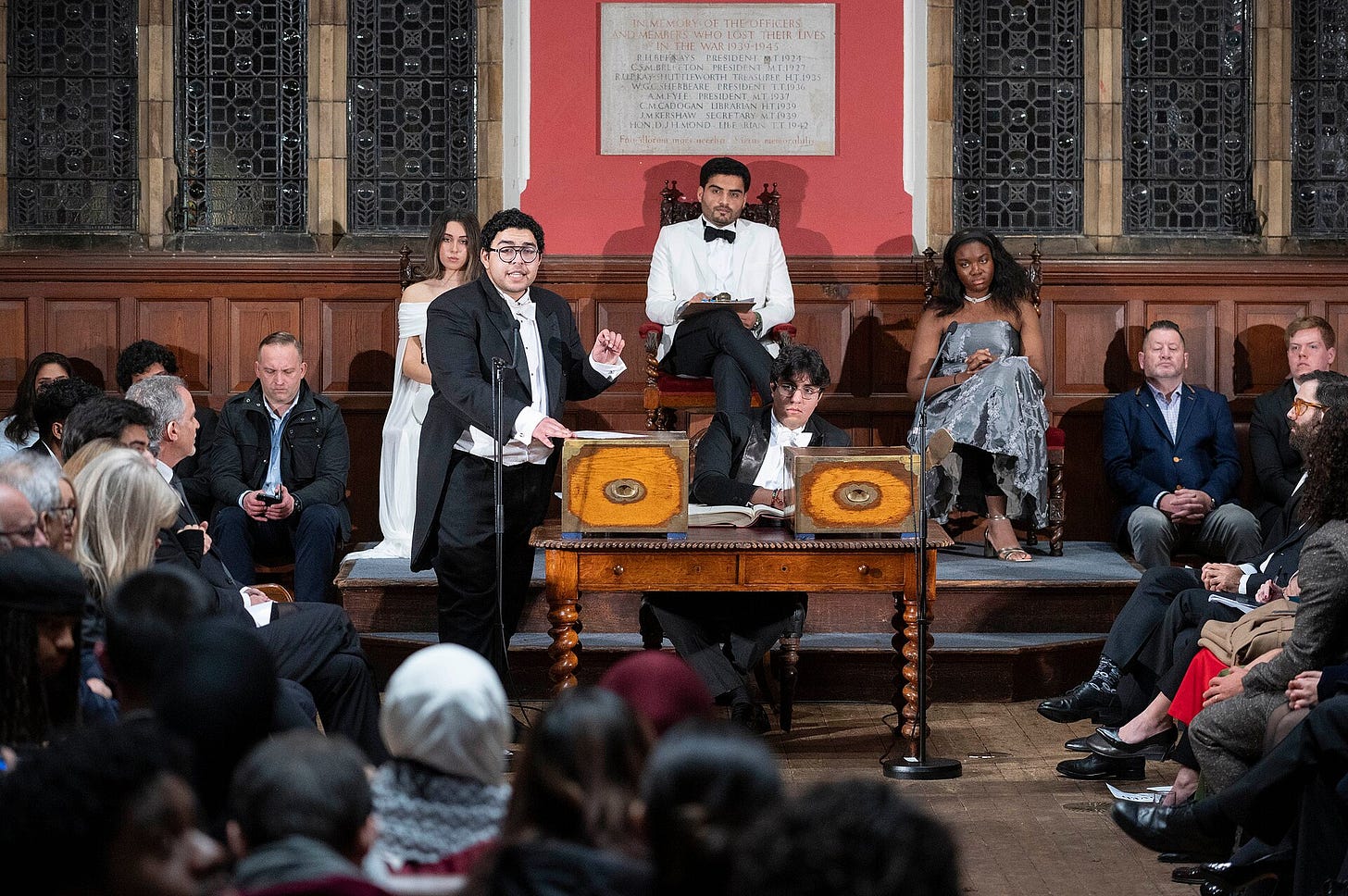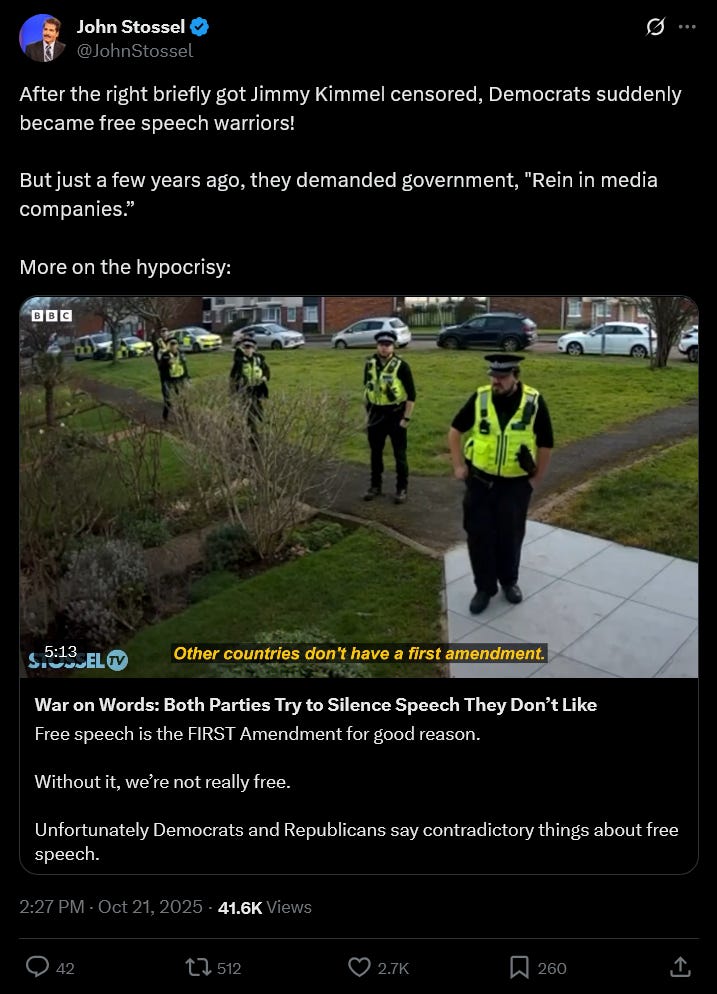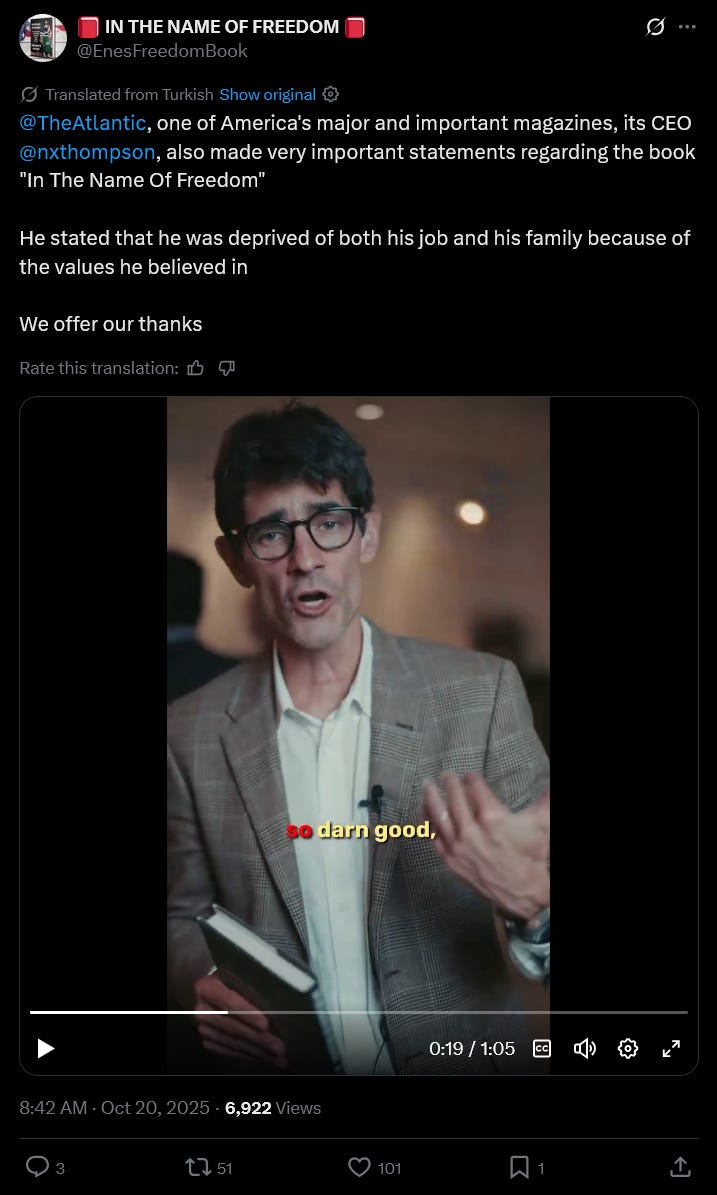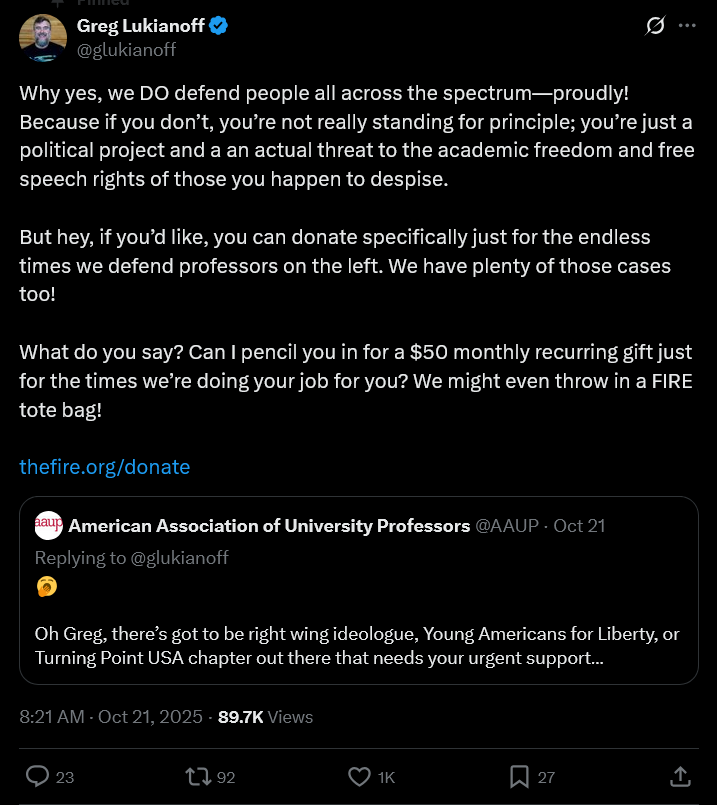E-Pluribus |October 24, 2025
Journalism conference bans right-wing students. Oxford Union ousts president over Kirk assassination comments. Could competition save America's universities?
A round-up of the latest and best insight on the rise of illiberalism in the public discourse:
Julia Kushner: Student journalism conference ‘killed’ talks by conservative writers
MediaFest 2025, a national conference for student journalists, disinvited two conservative reporters after they expressed heterodox opinions about immigration and abortion. The convention director claims he pulled the two speakers’ invitations after being informed that at least one of their articles was factually inaccurate. But as the College Fix reports, for good or for ill, that’s a high bar for any journalist to clear—much less a student journalist.
Organizers disinvited both women after Steven Sandberg, the general manager of student media at Oregon State University, complained about the two journalists.
Sandberg told the Columbia Journalism Review the reason he did so was because, “I saw pretty far-right, anti-LGBTQ language” in their reporting.
He also told the Review he would be unwilling to send his students to MediaFest 2025 if Olohan and Allen were included. Sandberg did not respond to two emails from The Fix last week asking for comment.
However, a communications professor at DePauw University criticized the organizers’ decision to disinvite the two journalists.
“If all journalists are prevented from speaking at MediaFest because of supposed inaccurate reporting, then there will be nobody left to speak,” Professor Jeff McCall told The College Fix by email.
“It is quite ironic that a conference to promote the free press and free expression is unwilling to hear from other reporters who might have different political or social leanings,” McCall said. “This demonstrates that the journalism industry is still beholden to left-of-center advocacy and not interested in a true marketplace of information and ideas.”
Meanwhile, the student journalist conference still welcomed leftist journalist Nikole Hannah-Jones to speak at the event this year. She is the author of the New York Times’ 1619 Project, a series of articles about America’s founding that has been widely criticized for historical inaccuracies.
Matthew Petti: Oxford Union Ousts President Over Insults to Charlie Kirk
Britain’s legendary Oxford Union debating society recently ousted its president over cruel comments he made in the wake of Charlie Kirk’s murder. At Reason, Matt Petti examines the fallout, noting how profoundly American politics can impact the global debate over free speech:
On Tuesday, the union announced that its members had voted to remove President-elect George Abaraonye, an undergraduate, following a media storm over his comments on the assassination of Turning Point founder Charlie Kirk. In an Instagram post, Abaraonye accused outgoing President Moosa Harraj, a graduate student, of running a “compromised” vote. Abaraonye implied that the remote voting system had been rigged, and promised to contest the results.
Approached in person, Abaraonye and Harraj both declined to comment.
Abaraonye, who had debated Kirk at the Oxford Union in May 2025, laughed at his debate opponent’s death on his personal Instagram story and in a 1,000-member freshman group chat. Predictably, those comments were leaked to the press and became part of the trans-Atlantic controversy around Kirk’s murder. Abaraonye offered an apology, albeit one that still blamed Kirk for spreading hatred, arguing that his joke was “no less insensitive than” Kirk’s rhetoric.
The British branch of Turning Point threatened a “direct action campaign“ against the Oxford Union if Abaraonye was not removed as president, and even U.S. Sen Ted Cruz (R–Texas) weighed in to demand Abaraonye’s ouster. The union, which condemned Abaraonye’s comments, complained in a statement that he was receiving “racial abuse” and “threats to his life.” Abaraonye filed a no-confidence motion against himself—the British equivalent of impeachment proceedings, voted on by all Oxford Union members—as a sign of how confident he was in his popular support.
In other words, American political controversy was tearing apart a storied institution in Europe. All politics is local politics, the saying used to go. With social media, a different saying seems more apt: When America coughs, the world gets a cold. But the blowup at the Oxford Union was not only about the fatal shooting in Orem, Utah. It became a referendum on free speech and its consequences, mixed in with the characteristically complicated and cutthroat internal politics of Britain’s most famous free speech society.
Michael Torres: A Long-Overdue Shakeup in Higher Education
America’s universities have become downright hostile to free speech and the open exchange of ideas. Michael Torres at City Journal argues that competition from rival educational institutions is the answer:
New entrepreneurs are coming to the fore. And like their nineteenth-century predecessors, they are not intimidated by the powers that be. City Journal’s new College Rankings system, the Classic Learning Test (where I work), and the rise of new educational institutions, each serve as inspiring examples.
The new College Rankings provide a refreshing window into where colleges and universities truly stand. By including variables such as a faculty and student ideological pluralism, support for free speech, return on education investment, and quality of courses, this tool will give students the opportunity to view their options clearly.
The three highest-ranked universities underscore the power of innovation. The Universities of Florida, Texas, and North Carolina have each launched nation-leading colleges or institutes focused on civic and classical education. These programs reinvigorate the undergraduate study of a subject matter disregarded as a relic of an oppressive past by the dominant orthodoxy.
But innovation is not relegated to incumbent institutions. Wyoming Catholic College (launched in 2007) and the University of Austin (launched in 2021) have provided vivid examples of what it means to bring competition to the higher education marketplace. Like some educational ventures of the nineteenth century, these institutions were made possible by the investment of private individuals and groups who saw the need for something new. And the leadership of both institutions have taken firm stands against the equity orthodoxy.
Meantime, the CLT, and several new accreditation organizations currently seeking Department of Education approval, aim to hold students and institutions of higher education, respectively, to a higher objective standard.
The CLT, launched by a former teacher and SAT test-prep company owner, stands as an alternative to the SAT and ACT. It presents students with substantial reading passages from classic works of literature, history, philosophy, and the sciences. Its math section tests both students’ reasoning ability and mathematical achievement—no calculators allowed.
With a new civics exam and an alternative to the College Board’s Advanced Placement program set to roll out in 2026, we aim to hold college-bound students to an ambitious standard while validating what we call “classic” forms of education. Only one student has earned a perfect score on the CLT; nearly 200,000 students are expected to take the exam this year.
Both university systems and policymakers in a growing number of states have begun to recognize the need for competition in the long-stagnant testing marketplace. One of the first public university systems to adopt the CLT, the State University System of Florida, is also working to bring the new accreditation models to fruition. Led by Chancellor Ray Rodriguez, the system has gathered a consortium of six public university systems to create the Commission for Public Higher Education. The commission will be a much-needed alternative in an industry dominated by a few out of touch national organizations.
Around X
Perennial gadfly John Stossel calls out double standards in the First Amendment debate. It seems many people who today are dedicated free-speech warriors only recently lobbied the government to clamp down on…free speech. Hypocrisy be thy name, says Stossel.
Atlantic CEO Nicholas Thompson outlines the harrowing story of a top NBA draft pick who gave up a promising basketball career to defend free speech in the US and abroad:
Greg Lukianoff, president of the Foundation for Individual Rights and Expression (FIRE), explains the necessity of defending all free speech, not just the speech you happen to like:



